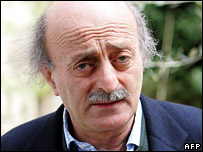 WASHINGTON: Sources here heartily welcomed the visit of March 14 Forces leader, Chouf MP Walid Jumblatt. Unlike Washington’s usual line in friends among the different Arab groups, whose influence often relies on American funds and political support, Jumblatt is a leader in his own right and belongs to a coalition that enjoys popular support in his country and an elected majority bloc in Parliament.
WASHINGTON: Sources here heartily welcomed the visit of March 14 Forces leader, Chouf MP Walid Jumblatt. Unlike Washington’s usual line in friends among the different Arab groups, whose influence often relies on American funds and political support, Jumblatt is a leader in his own right and belongs to a coalition that enjoys popular support in his country and an elected majority bloc in Parliament.
Unlike Iraq’s Ahmad Chalabi and Lebanon’s Michel Aoun, Jumblatt is not seeking American support for personal gain.
Jumblatt has always observed the rules of the game in Lebanon and realizes that his ambitions, as a Druze, are limited to commanding a considerable parliamentary bloc in his homecountry.
Jumblatt already commands such a big bloc and belongs to a bigger solid parliamentary coalition. Accordingly, a healthy parliamentary democracy remains Jumblatt’s best bet.
As a result Jumblatt is believed to have carried genuine Lebanese national concerns to Washington without either any personal ambitions or hidden agenda.
Also, unlike many of America’s Arab opportunist friends, Jumblatt is not sweet talking Washington into any ambiguous adventure. On the contrary, the March 14 leader is a veteran politician who knows exactly what he’s talking about.
In his own words, Jumblatt has set conditions for what he described as his "long political trip" to the U.S. as he cited Washington’s announced change in its foreign policy as having been his motive for this shift.
As Jumblatt understands it, the U.S. has given up on its previous policy of "friendly dictators" or those regimes whose behavior used to benefit Washington at a low cost, in return for sponsoring democracies in countries where such dictators are being replaced.
Washington has been trying to convey to the Arab world for a while now, but without much success, this idea. Jumblatt is among the few Arab leaders who is taking Washington at its word and giving it the benefit of the doubt in this regard.
Still, Jumblatt is not in the tradition of letting Washington hear what it wants to hear. The veteran politician is known for his bold opinions. In his talks, Jumblatt has highlighted to the administration the flaws and discrepancies between its rhetoric and its action. If the U.S. supports democracy, it should respect the outcome of democratic elections without exception.
Along these lines, Jumblatt opposed what many in Washington might have wanted to hear and stood his ground regarding his opinion that democracy alone is needed and
cannot have pre-determined American-friendly results.
Jumblatt’s message was that America should give a chance to groups that it views as fundamentalist and let them get involved in the democratic process. This will shape their experience and moderate their tone.
Jumblatt said time and again in his meetings that the solution for disarming Hizbullah will come through dialogue.
As such, Jumblatt is genuinely reciprocating Washington’s initiative for the democratization of the Middle East, which so far looks to have been a failure, by giving honest advice.
American officials here have also learned from Jumblatt how Lebanon and Syria should have been the cornerstone of this democratization policy.
Lebanon has always been the Arab world’s trendsetter with a robust civil society and a relatively free press and could serve as the starting point for the democracy "domino effect" that America had originally chosen Iraq for.
Both Washington and Jumblatt realize the urgency for dealing with the Lebanon question as President George W. Bush enters the second half of his second office and the mandate of French President Jacques Chirac nears its end.
Jumblatt has tipped off the Americans as to the secret behind the survival of regimes like Syria and Iran: They benefit from the rotation of power in the West. Such regimes also bet on the impatient Western public vis-a-vis their lifelong leadership.
Jumblatt has told decision-makers in Washington that the Syrian regime is currently buying time waiting for the election of new leaderships in Western capitals and hoping their fortunes would change accordingly.
The Chouf MP has been advising these capitals to speed things up before the end of their tenures and try to pass on their experience to their successors so that any new leadership can stand its ground and keep up the pressure on Arab dictatorships until democracy is achieved.
While the Arab populist leaders have always warned their followers of the imperial "American" agenda, Jumblatt has taken a bold step by coming to Washington and trying to shape the agenda in a way that he believes would be in the interest of both the U.S. and the Arab world. So far, Washington seems to believe his genuine drive and looks set to act accordingly.



